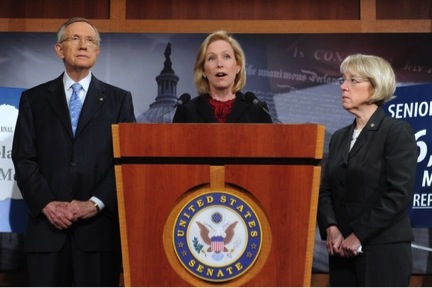Let Us Forget Demagoguery And Face Facts!
Stanley Feld M.D.,FACP,MACE
I understand that President Obama wants to win the election in 2012. He will do everything in his power to win it.
I understand politicians do everything to spin an issue in their favor to win an election.
I know that politicians believe many issues are too complicated for Americans to understand. The reason we elect government officials as our surrogates is for them to understand the issues and vote for our vested interest.
How many congressmen read President Obama’s entire healthcare bill and believe they voted for citizens’ vested interest? I bet the answer is not many.
I have pointed out how President Obama presented the CBO with false assumptions to manipulate budgetary conclusions. Appointed CBO officials and Medicare actuaries find President Obama’s conclusions difficult to believe.
Finally, a congressman has stood up and said let us look at the facts, America must face where we are headed. It is his responsibility to the American people to explain these facts. Americans are capable of understanding these facts and the consequences of the facts. Paul Ryan believes in the intelligence of the American people.
The trick is to get Americans to listen. I used to worship the New York Times. It was the place to get the facts. It has become biased.
At a recent party politics became a hot topic. The discussion was about the Republicans not having a candidate able to beat President Obama in 2012. People quoted articles from the New York Times and Time Magazine as the ultimate authority.
I was very quite. I was quiet because I could not believe that intelligent people would believe the hogwash they were quoting. President Obama has had a terrible record. Just look at President Obama’s economic policy, foreign policy and healthcare policy.
Here are a couple of examples in two recent New York Times editorials;
"Rep. Ryan’s Dubious Sales Pitch"
Published: May 29, 2011
"Representative Paul Ryan is rebutting critics of his plan to turn Medicare into a “premium support” program, pointing to two existing programs that he says prove
his approach would be better for beneficiaries. Don’t believe it."
My immediate reaction looking at the editorial while eating breakfast was, “I got it.” “Paul Ryan’s plan is no good. The media is indeed the message. Forget about critiquing the details.
The second article was more subtle.
Published: May 28, 2011
Republican leaders in the Senate have spent weeks gleefully deriding the Democrats who run the chamber for not producing a budget proposal in more than two years. It is a classic tactic, designed to deflect attention from their party’s toxic plan to privatize Medicare.
In the second quote it is a given that the Ryan Plan is toxic. Again, no facts. If the New York Times said so, the Ryan Plan must be toxic.
No one at the party I mentioned has yet to be affected by President Obama’s policies yet. I am sure they will start paying attention to his policies when his policies affect their life, standard of living, and freedoms.
President Obama is building the infrastructure to affect all of the above. As he is building the infrastructure he and the Democratic Senate are bankrupting the country.
I have not seen tremendous support by the Republicans for Paul Ryan’s budget.
Paul Ryan’s budget does not attack entitlements in the near term. It attacks the government waste President Obama’s own National Commission on Fiscal Responsibility and Reform pointed out.
It is best to hear from Paul Ryan himself. Paul Ryan’s goal is to help Americans become less dependent on government, not more dependent.
Government should make rules that level the playing field for all stakeholders in all areas and then get out of the way. It should enforce the rules equally and fairly.
To my chagrin only 256 people watched this You Tube announcing the Ryan Plan. In announcing the budget Mr. Ryan points out the path to disaster President Obama is heading us into. He then goes on to describe the path to prosperity we must take.
If you want to hear what Paul Ryan really has to say rather than having it editorialized by the New York Times and the traditional media, it is worth watching this You Tube.
The facts are more important than hearsay.
The opinions expressed in the blog “Repairing The Healthcare System” are, mine and mine alone.

For years, my physician said “eat less, exercise more.” She had the mantra right, but never asked how much I eat or how much I exercised. More importantly, she never took her message the next step to help “activate” this message. It would have been helpful to hear concrete examples of what eat less exercise more looks like for a person of my age, height, weight. After hearing her simple mantra I would start to visualize giving up all the foods I like and exercising every day to try to accomplish her mantra… This was never going to happen.
Your suggestion to get started by making slow incremental changes is right on! I eventually activated my own message to myself and slowly started cutting out little things that didn’t really matter (I stopped eating bread before dinner, I take only 3 bites of dessert to get the taste instead of finishing dessert every time, I take the stairs instead of taking the elevator when I can), and over the course of 2 years, I’ve seen significant improvements in my overall health.
If the changes in food choices and lifestyle are too dramatic too quickly, people will resist the change because it is too unpleasant to give up what we enjoy and have gotten used to. If we make smaller more tolerable changes that can then become integrated into our lifestyle, then it becomes easier to maintain AND incrementally add the next slight change that can make an even bigger difference.
Just my 2 cents. Thx.